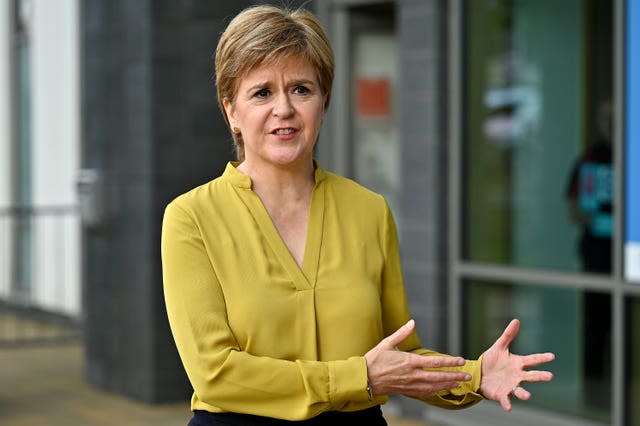Scotland’s deficit doubled as pandemic saw spending increase and revenues fall
Scotland’s deficit more than doubled to 22.4% of GDP in 2020/21, the highest yearly figure since the Government’s annual accounts began two decades ago.
Spending increased by 21% during the year, reflecting the impact of the pandemic, while average public spending per person also rose to £1,828 above the UK average.
The figures were revealed in the Government Expenditure and Revenue Scotland (Gers) figures published by the Scottish Government.
These are the first figures which fully cover the coronavirus pandemic and the Government interventions around it, as last year’s report included only a few weeks from the start of the outbreak.

Both the UK and Scottish deficits increased during the year, with the UK’s up by 11.6 percentage points and Scotland’s increasing 13.6 percentage points.
The report said: “This reflects the impact of Covid-19, which has seen falls in revenue, increased expenditure, and falls in GDP, all of which contribute to the increase in the deficit.”
Scotland’s 22.4% deficit is more than double last year’s and is the largest since the Gers figures began recording the data in 1998.
As well as the impact of coronavirus, the fiscal position was also affected by declining activity in the North Sea and a fall in oil prices.
This led to a drop in North Sea GDP of 40%.
Total public expenditure in Scotland during 2020/21, covering both Scottish and UK government spending and the rest of the public sector, was £99.2 billion.
This is equivalent to 9.1% of total UK public sector expenditure, or £18,144 per person – which is £1,828 per person greater than the UK average.
Politicians on either side of the independence debate clashed over the figures, with First Minister Nicola Sturgeon insisting Scotland’s current fiscal position is not any indication of what life would be like if the country was to become independent.
She told the PA news agency: “Almost every country has a deficit and deficits that have grown and become massive over the course of the pandemic because, rightly, governments have chosen to support the economy and to support individuals.

“When we see spending increases in Scotland, that’s a good thing because it shows that that support has been there and it’s been provided to people and public services across the country.
“Having a deficit is not – self evidently – a barrier to any country in the world being independent.
“Independent countries manage their deficits but also independent countries make the most of their talents and their resources and their attributes to build strong, sustainable economies, and that is – I think – the future that Scotland should grasp.
“The fiscal position of Scotland now is a feature of how we’re governed within the UK, it is not any indication of what life would be like in an independent Scotland and there is no reason whatsoever that Scotland as an independent country wouldn’t have the same ability to succeed as countries across the world – many of whom, of course, have far fewer resources, and attributes than Scotland.”
Scottish Finance Secretary Kate Forbes said: “These statistics clearly highlight the significant economic impact of the pandemic.
“Scotland’s economy contracted by about 10% last year, which is in line with the performance of the UK economy.
“The pandemic has not only changed people’s lives but it has fundamentally shifted our fiscal landscape, with countries and markets around the world reassessing what represents a viable deficit.
“The Gers figures reflect Scotland’s position within the UK, under which 40% of spending and 70% of revenue income is reserved to the UK Government.
“The pandemic has clearly demonstrated the need for fiscal reform and that the Scottish Government’s financial powers are insufficient to deal with the new economic reality.”

Murdo Fraser, the Scottish Conservative shadow Covid recovery secretary, said the figures show the extent of the UK Government’s support during the pandemic, such as the furlough scheme.
He said: “These new figures demonstrate the strength and security that we gain as part of the United Kingdom.
“In times of crisis, when a pandemic hits, Scottish jobs and public services are safer because we act together.
“The UK Government has delivered a war chest to fight Covid, back our NHS, and support Scotland’s economic recovery.”
Scottish Secretary Alister Jack said: “These figures show how all of us in Scotland have benefitted from being part of a strong United Kingdom.
“Public spending in Scotland reached nearly £100 billion as we tackled the pandemic and protected lives and livelihoods.
“Unprecedented UK Government support has allowed us to treat patients, vaccinate people, protect a third of our workforce through furlough and issue crucial loans to more than 90,000 Scottish businesses.”


